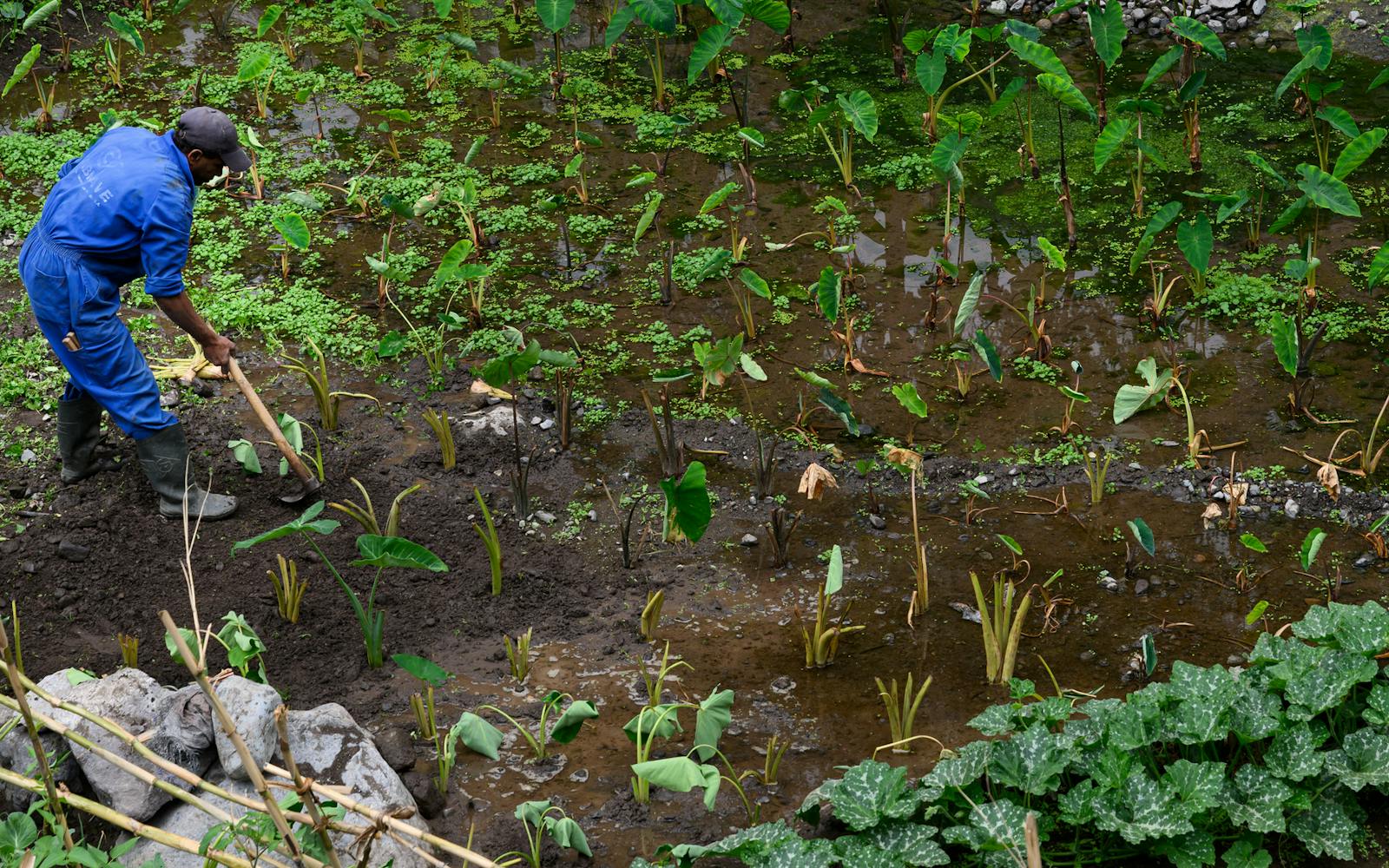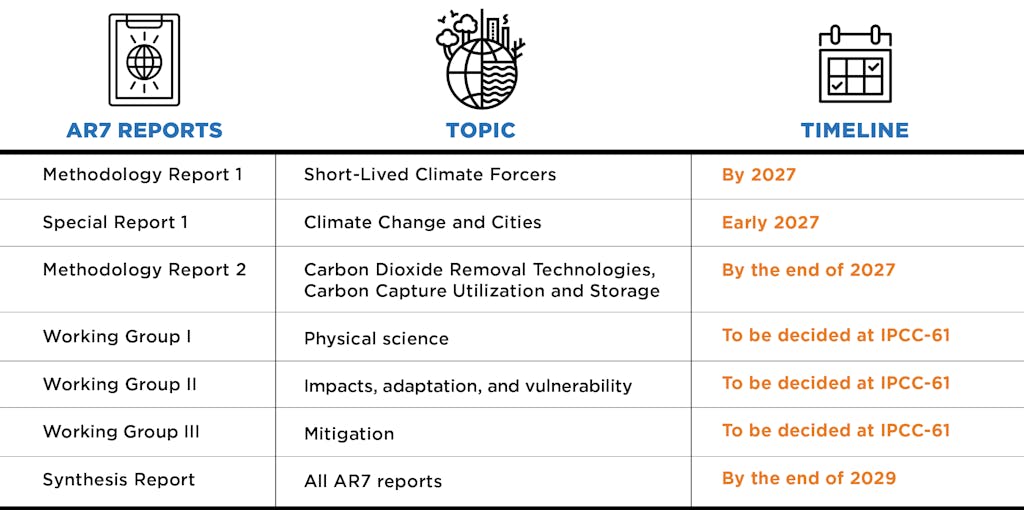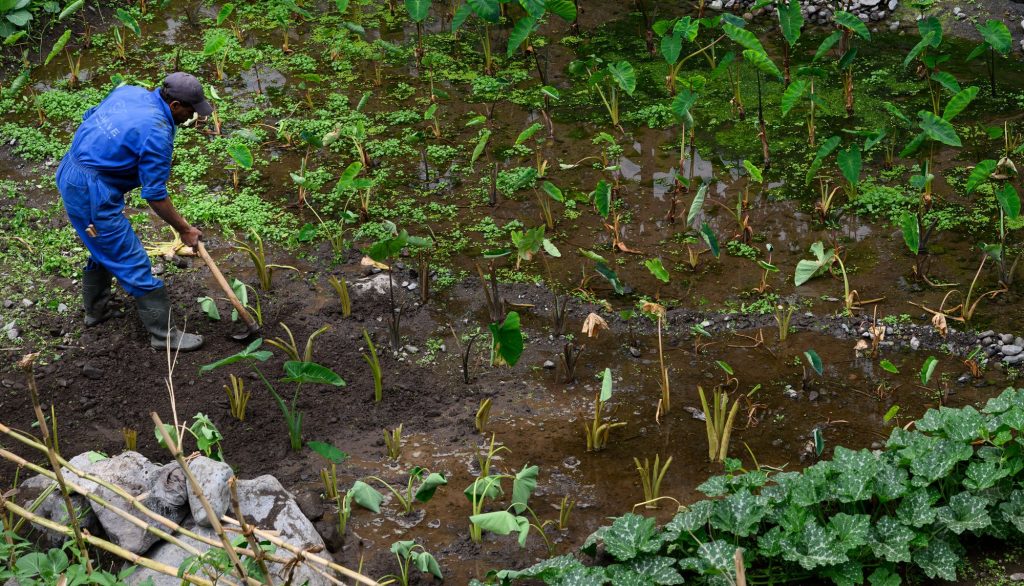

The United Nations is supporting the transformation of the agricultural sector of Santo Antão, the westernmost island of Cabo Verde. The project is creating new farmland in an arid climate by supporting irrigation and sustainable farming practices, including growing and marketing bananas and other sustainable products instead of sugar cane. Photo: UN Photo/Mark Garten
After marathon negotiations in Istanbul, the Intergovernmental Panel on Climate Change agreed to its most ambitious timeline yet for its seventh assessment cycle. The 2029 deadline will ensure that decision-makers have the latest climate science in time for the next Global Stocktake, which will tell us what it will take to keep the Paris Agreement’s 1.5°C target within reach.
As the UN agency responsible for assessing the science of climate change, the Intergovernmental Panel on Climate Change (IPCC) has shaped our understanding of the existential threat of a warming world. Since its founding in 1988, the IPCC has produced a series of groundbreaking reports that support the scientific case for global climate action. And in 2018, the agency permanently changed the global conversation on climate change with its special report on the consequences of breaching the 1.5°C temperature target above preindustrial levels.
Delegates met in Istanbul, Türkiye for the Sixtieth Session of the Panel (IPCC-60) to decide on the report topics and timeline for its seventh assessment cycle (AR7). The newly elected Chair, Vice Chairs, and Co-Chairs, along with member governments and observer organizations, are applying lessons learned from the sixth assessment cycle that concluded in 2023, such as the increased likelihood of delay in report timelines and the need for further collaboration between teams.
“This cycle rests on the shoulders of previous cycles … building on both the achievements … and the important lessons we have learned,” IPCC Chair Jim Skea said in his opening remarks at IPCC-60. Looking ahead to AR7, he reiterated the IPCC’s commitment to “use the best available science to deliver focused, policy-relevant reports and provide timely and actionable information to policymakers,” and to “spare no effort to ensure a truly inclusive, diverse and representative IPCC” in pursuit of those aims.
Every Year Counts in Race to Reach Paris Agreement Goals
The IPCC took a decisive step away from business as usual by deciding that the final report in the cycle — the Synthesis Report — should be produced within five years, by the end of 2029, rather than the usual seven. That may not seem like much, but every year matters as we race to keep the Paris Agreement’s 1.5°C temperature target within reach. Those two years mean that one or two, if not all, of the three working group reports on the physical science of climate change, climate impacts, future risks, and adaptation and mitigation will be completed by the end of 2028.
As a result, the best available science will inform key UN processes that will ultimately shape how countries respond to global warming. For example, the reports produced during the cycle will inform the second Global Stocktake (GST-2) under the Paris Agreement, which provides a critical moment of self-assessment on where the world stands in the fight against climate change. “By aligning IPCC and GST activities and timelines we can spearhead climate ambition and action — a win for the planet,” Simon Stiell, Executive Secretary of the United Nations Framework Convention on Climate Change (UNFCCC) explained. As the deadline for the 2030 Agenda arrives, the reports will also help leaders evaluate progress toward the Sustainable Development Goals in the final years of this decade.
“This body has, cycle by cycle, grown into the absolute authority on climate science,” said Inger Andersen, UN Under-Secretary-General and Executive Director of the UN Environment Programme, during the opening of the IPCC-60. “However, as I see it, the seventh cycle may be the most important yet … providing the science to back the work that must be done.”
“This body has, cycle by cycle, grown into the absolute authority on climate science.”
Inger Andersen
UN Under-Secretary-General and Executive Director of the UN Environment Programme
The IPCC has also made clear that climate adaptation will be a priority for its next assessment cycle. The Panel will update the 1994 Technical Guidelines for Assessing Climate Change Impacts and Adaptation to reflect critical science discovered during the 30 years since it was published. In addition, IPCC will launch a Special Report on Climate Change and Cities, as urban adaptation will determine how over two-thirds of the world copes with climate impacts. This increasing focus signals the importance of adaptation to climate policies and finance and will inform countries’ national adaptation plans, which are due in 2030 as mandated by the UNFCCC.
AR7: Five Years to Produce Seven Reports
After marathon negotiations pushed IPCC-60 into overtime, member governments agreed in part to a program of work. The five-year cycle will contain seven reports.

This table outlines the reports expected from the IPCC’s 7th assessment cycle.
While reaching unanimous agreement among all 195 of the IPCC’s member governments is extremely challenging, it serves an important function that isn’t replicated anywhere else in the world of climate science: Each report represents official government consensus on the current state of climate science. At IPCC-60, the final negotiating session that stretched over 24 hours ultimately failed to set a specific timeline for the cycle’s seven reports. But importantly, members agreed to reconvene at IPCC-61 this summer.
In the interim, IPCC leadership will work on creating a schedule for the working group reports, detailing the exact month and year that each report will be produced. At the end of July, members will come back to the negotiating table at IPCC-61 to discuss and agree on this timeline. They will also negotiate the outlines for the Methodology Report on Short-Lived Climate Forcers — non-carbon dioxide pollutants that detrimentally effect people’s health and the environment; and the Special Report on climate change and cities. Both reports have upcoming Scoping Meetings in February and April, respectively.
With key questions remaining, the year ahead will shape the ultimate trajectory of the IPCC’s seventh assessment cycle. However, the fact that governments have now agreed to this accelerated timeline reflects the importance of the IPCC’s role in informing international climate negotiations and policies. By ensuring that the bulk of the IPCC’s forthcoming reports will be completed before the next Global Stocktake in 2028, the IPCC will continue to inform vital policy decisions in the final sprint to 2030 — decisions that will determine what kind of planet current and future generations will call home.
Dive Deeper
The IPCC has a range of resources available to help you track the latest developments as the seventh assessment cycle gets underway.

